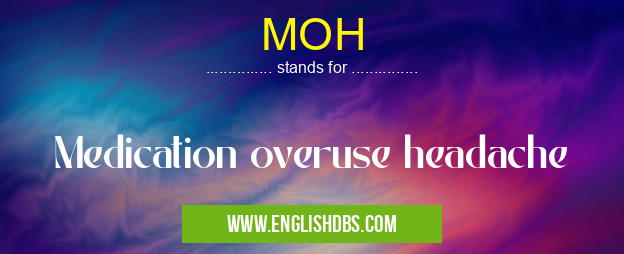What does MOH mean in CLINICAL MEDICINE
Medication overuse headache (MOH) is a form of chronic headache disorder caused by the excessive use of certain medications to treat acute head pain or migraine episodes. MOH is a long-term disorder, usually taking at least three months of reduced or discontinued medication use before returning to normal headache patterns. This article will provide an overview of MOH and answers to some frequently asked questions

MOH meaning in Clinical Medicine in Medical
MOH mostly used in an acronym Clinical Medicine in Category Medical that means Medication overuse headache
Shorthand: MOH,
Full Form: Medication overuse headache
For more information of "Medication overuse headache", see the section below.
Essential Questions and Answers on Medication overuse headache in "MEDICAL»CLINICAL"
What medications can cause medication overuse headache?
Rebound headaches are most commonly associated with the use of triptans, opioids, ergotamine derivatives (such as Cafergot), and combination analgesics that contain both acetaminophen and caffeine or other non-steroidal anti-inflammatory drugs (like Aleve). Other medications that have been linked to MOH include barbiturates, butalbital, sedatives, muscle relaxants, and narcotics such as codeine.
How long does it take for medication overuse headaches to improve?
Improvement from MOH typically begins after three months of decreased or stopped use of triggering medications. Individual responses may vary depending on the severity of the condition and other factors; improvement may begin sooner in some cases while it takes longer in others.
Does medication overuse headache always require treatment?
While most people with MOH recover if they stop using problematic medications, some cases may be severe enough that medical intervention is needed. In these cases, doctors may prescribe additional medication or recommend lifestyle changes (such as stress management techniques) to help control symptoms and prevent future flare ups.
Are there any serious risks associated with medication overuse headache?
Without proper treatment, chronic headaches caused by MOH can lead to an increased risk for depression, anxiety, impaired physical performance, decreased quality of life, difficulty sleeping and eating habits, social isolation, and permanent neurological damage.
Can medication overuse be prevented?
Yes - preventive measures like limiting triggers through lifestyle modifications (such as avoiding alcohol or caffeine), relaxation techniques (such as yoga or mindfulness exercises), talking with a doctor about potential causes and treatments for migraine episodes before taking any medications are all helpful strategies for reducing the chances of developing medication overuse headaches.
Final Words:
Medication overuse headaches can have a significant impact on quality of life if left untreated. It's important to educate yourself on the possible risks associated with using certain drugs too often so you can make informed decisions about your health care choices. With proper prevention and treatment strategies in place though — like reducing triggers through lifestyle changes and talking with a doctor — you can avoid the development of this type of chronic head pain disorder.
MOH also stands for: |
|
| All stands for MOH |
